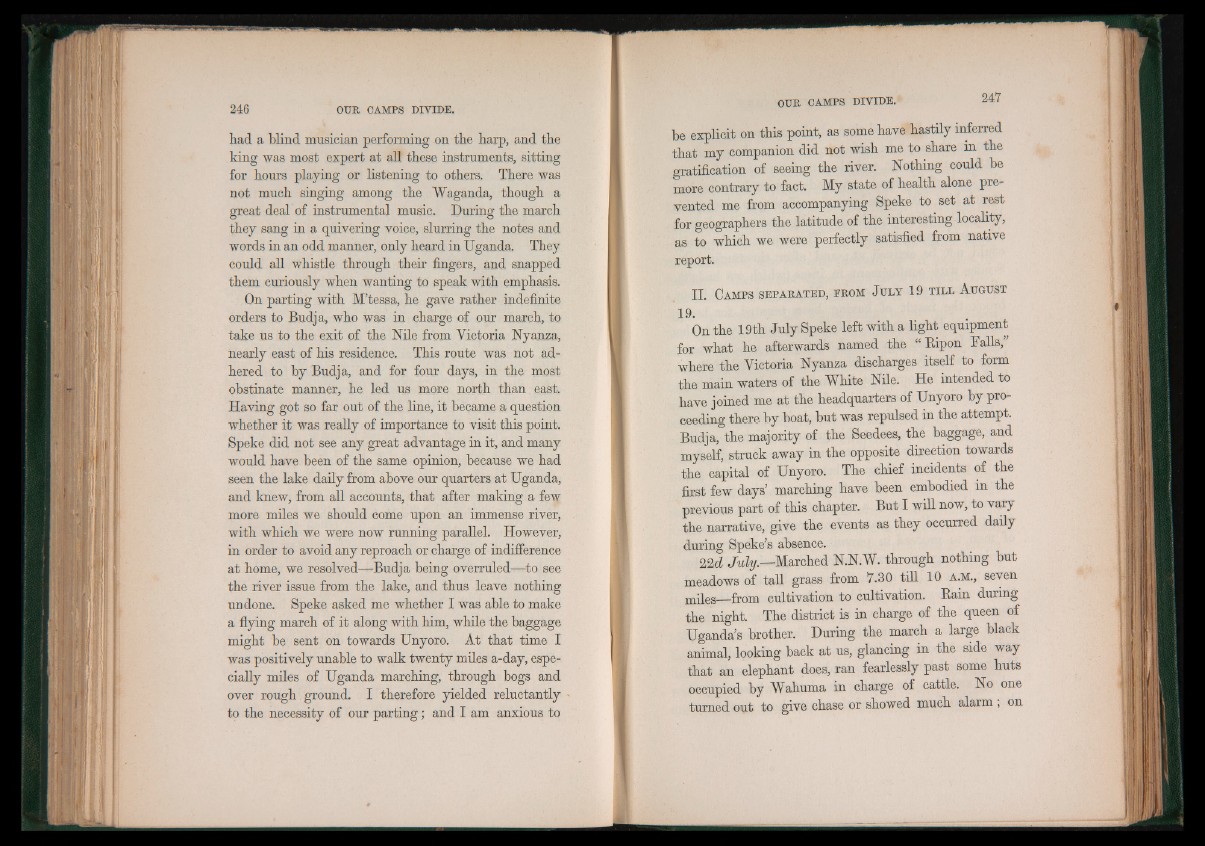
had a blind musician performing on the harp, and the
king was most expert at all these instruments, sitting
for hours playing or listening to others. There was
not much singing among the Waganda, though a
great deal of instrumental music. During the march
they sang in a quivering voice, slurring the notes and
words in an odd manner, only heard in Uganda. They
could all whistle through their fingers, and snapped
them curiously when wanting to speak with emphasis.
On parting with M’tessa, he gave rather indefinite
orders to Budja, who was in charge of our march, to
take us to the exit of the Nile from Victoria Nyanza,
nearly east of his residence. This route was not adhered
to by Budja, and for four days, in the most
obstinate manner, he led us more north than east.
Having got so far out of the line, it became a question
whether it was really of importance to visit this point.
Speke did not see any great advantage in it, and many
would have been of the same opinion, because we had
seen the lake daily from above our quarters at Uganda,
and knew, from all accounts, that after making a few
more miles we should come upon an immense river,
with which we were now running parallel. However,
in order to avoid any reproach or charge of indifference
at home, we resolved—Budja being overruled—to see
the river issue from the lake, and thus leave nothing
undone. Speke asked me whether I was able to make
a flying march of it along with him, while the baggage
might be sent on towards Unyoro. At that time I
was positively unable to walk twenty miles a-day, especially
miles of Uganda marching, through bogs and
over rough ground. I therefore yielded reluctantly
to the necessity of our parting; and I am anxious to
be explicit on this point, as some have hastily inferred
that my companion did not wish me to share in the
gratification of seeing the river. Nothing could be
more contrary to fact. My state of health alone prevented
me from accompanying Speke to set at rest
for geographers the latitude of the interesting locality,
as to which we were perfectly satisfied from native
report.
II. Camps s e p a r a t e d , e rom J u l y 19 t i l l A u g u s t
19.
On the 19th July Speke left with a light equipment
for what he afterwards named the “ Ripon Falls,
where the Victoria Nyanza discharges itself to form
the main waters of the White Nile. He intended to
have joined me at the headquarters of Unyoro by proceeding
there by boat, but was repulsed in the attempt.
Budja, the majority of the Seedees, the baggage, and
myself, struck away in the opposite direction towards
the capital of Unyoro. The chief incidents of the
first few days’ marching have been embodied in the
previous part of this chapter. But I will now, to vary
the narrative, give the events as they occurred daily
during Speke’s absence.
22d July.—Marched N.N.W. through nothing but
meadows of tall grass from 7.30 till 10 A.M., seven
miles—from cultivation to cultivation. Rain during
the night. The district is in charge of the queen of
Uganda’s brother. During the march a large black
animal., looking back at us, glancing in the side way
that an elephant does, ran fearlessly past some huts
occupied by Wahuma in charge of cattle. No one
turned out to give chase or showed much alarm , on